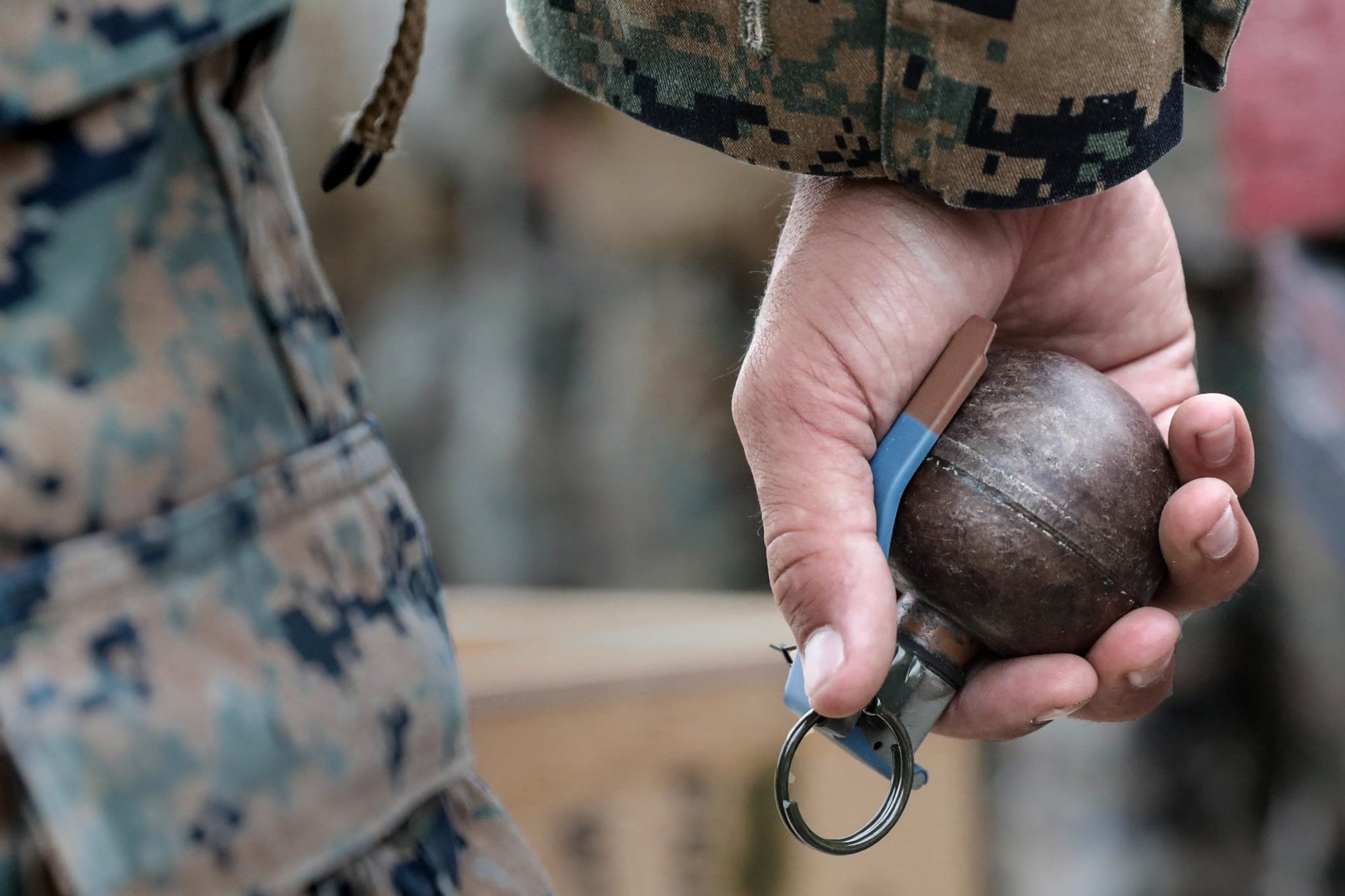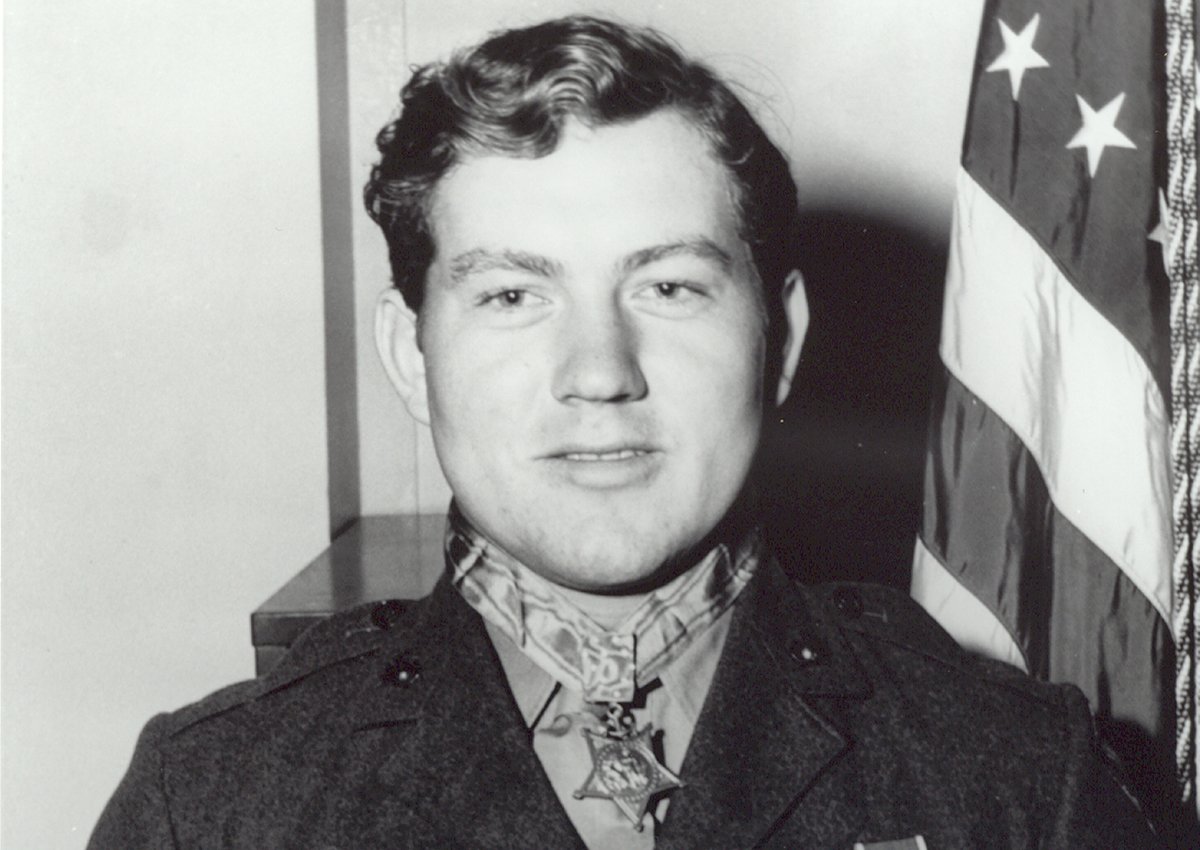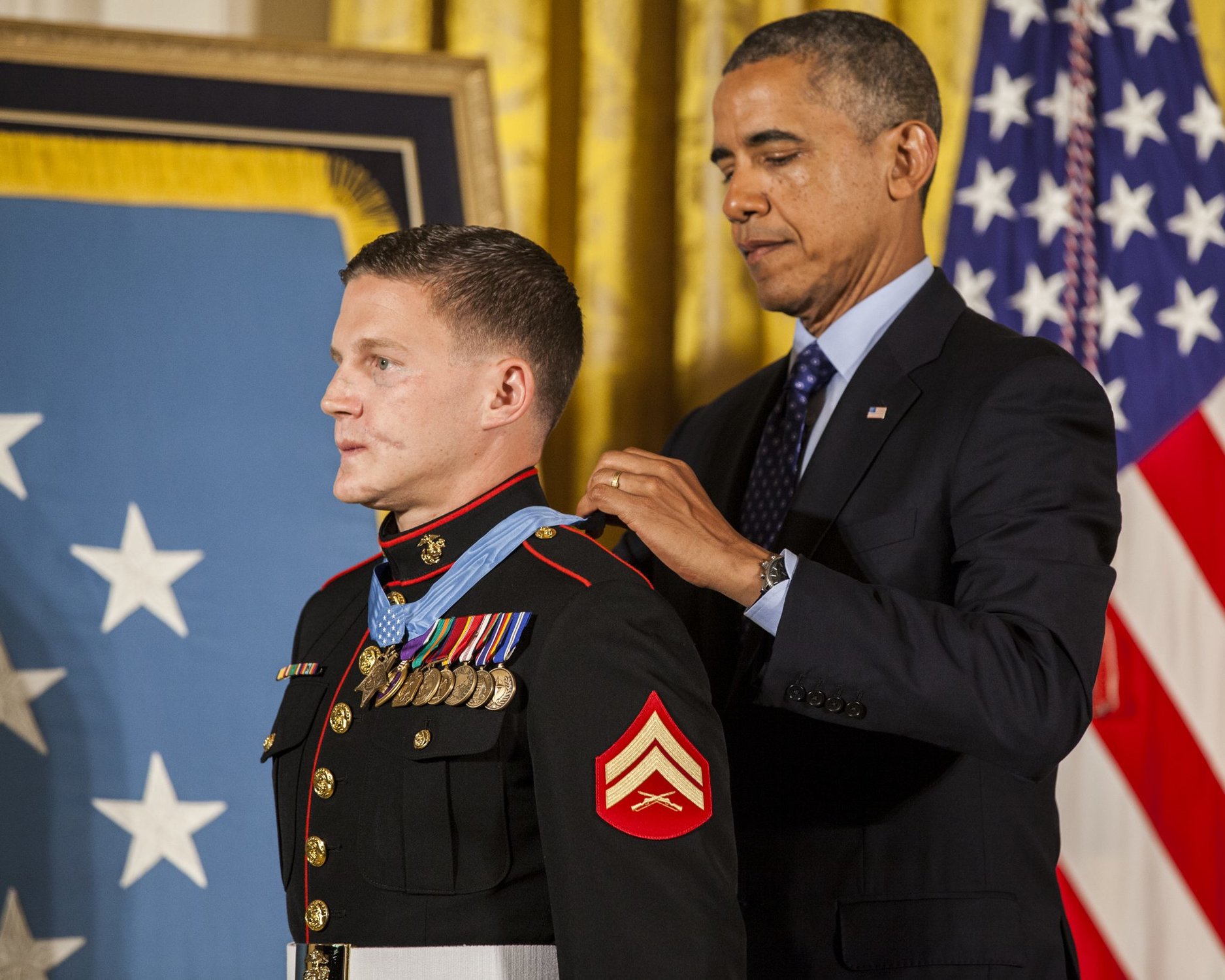
A US Marine holds an M67 hand grenade at a range on Camp Pendleton. US Marine Corps photo by Cpl. Teagan Fredericks.
Three to five seconds.
That’s the approximate time it takes for a grenade to explode. It’s barely enough time to think, let alone act, but diving on a grenade to smother the blast and sacrifice oneself to save others is a courageous act that many American service members have carried out.
It requires immeasurable bravery and selflessness to carry out an act for which death is all but guaranteed, but in several instances throughout history, exemplary service members have dived on grenades and survived the explosion.
Call it toughness, will, or just plain luck — these five American service members have defied the odds by diving on grenades and living to talk about it.
Marine Pfc. Jack Lucas

Just a few days after his 17th birthday, Marine Pfc. Jack Lucas was maneuvering with a fire team through a trench to assault an enemy position during the Battle of Iwo Jima. Lucas’ four-man element spotted 11 Japanese soldiers in a parallel trench, and a firefight ensued. When Japanese soldiers threw two fragmentation grenades into the trench, Lucas managed to gather both grenades underneath him in an attempt to smother the blast and save his fellow Marines. Despite only one of the two grenades detonating, Lucas was so egregiously wounded that his squad believed him to be dead and continued on with their assault. Lucas survived, thanks to the help of a passing Marine who realized Lucas was alive and called over a corpsman. Lucas later received the Medal of Honor for his actions that day. He was the youngest Marine and service member in World War II to receive the distinction.
Army Spc. John Baca
On Feb. 10, 1970, the lead platoon of Spc. John Baca’s company was ambushed and pinned under heavy enemy fire in Vietnam. Baca and his team maneuvered under fire to help the besieged platoon and eventually reached a defensive position within the platoon’s perimeter. Just as they were planning a counterattack, an enemy soldier lobbed a grenade into the middle of the patrol, and Baca threw himself on it to save the lives of his fellow soldiers. Baca survived his wounds and President Richard M. Nixon awarded him the Medal of Honor March 2, 1971.
Marine Cpl. Kyle Carpenter

On Nov. 21, 2010, in Helmand province, Afghanistan, then-Lance Cpl. Kyle Carpenter and a fellow Marine were pulling security on a rooftop position on the perimeter of Patrol Base Dakota when enemy combatants initiated a raid. An enemy grenade landed near Carpenter. Carpenter dove on the grenade and absorbed the blast with his body, saving the life of the other Marine on the rooftop that day. Carpenter survived the blast and was awarded the Medal of Honor for his actions. He is now an author and motivational speaker and has a hilarious Instagram bio.
Marine Cpl. Duane Dewey

On April 16, 1952, Marine Cpl. Duane Dewy was wounded by an enemy grenade while serving as the leader of a machine-gun squad near Panmunjom, Korea. While he was being treated by a Navy corpsman, a second grenade landed near his squad’s position. Dewey immediately yanked the corpsman out of the way and warned the other members of the squad before throwing himself on top of the grenade.
Dewey managed to survive two separate grenade blasts, as well as a gunshot wound to the abdomen. Dewey was released from active duty Aug. 19, 1952, and President Dwight D. Eisenhower awarded him the Medal of Honor on March 12, 1953. Eisenhower remarked that Dewey “must have a body of steel.”
Army Cpl. Robert D. Maxwell
As German forces closed in on their defensive position in Besançon, France, Sept. 7, 1944, Army Cpl. Robert Maxwell and three other soldiers were severely outnumbered and outgunned. When a grenade landed inside the group’s fighting position, Maxwell threw himself on it to save the lives of the other soldiers. Maxwell survived the blast and received the Medal of Honor on May 12, 1945.
Read Next: Three Inspiring Books About GWOT Marines Who Earned the Medal of Honor

Eric Miller is a former Army Combat Medic from Parkersburg, West Virginia. He holds a bachelor’s degree in history and has worked with homeless populations and veteran services throughout the state. He is an avid outdoorsman and has recently become interested in woodworking.
BRCC and Bad Moon Print Press team up for an exclusive, limited-edition T-shirt design!
BRCC partners with Team Room Design for an exclusive T-shirt release!
Thirty Seconds Out has partnered with BRCC for an exclusive shirt design invoking the God of Winter.
Lucas O'Hara of Grizzly Forge has teamed up with BRCC for a badass, exclusive Shirt Club T-shirt design featuring his most popular knife and tiomahawk.
Coffee or Die sits down with one of the graphic designers behind Black Rifle Coffee's signature look and vibe.
Biden will award the Medal of Honor to a Vietnam War Army helicopter pilot who risked his life to save a reconnaissance team from almost certain death.
Ever wonder how much Jack Mandaville would f*ck sh*t up if he went back in time? The American Revolution didn't even see him coming.
A nearly 200-year-old West Point time capsule that at first appeared to yield little more than dust contains hidden treasure, the US Military Academy said.












